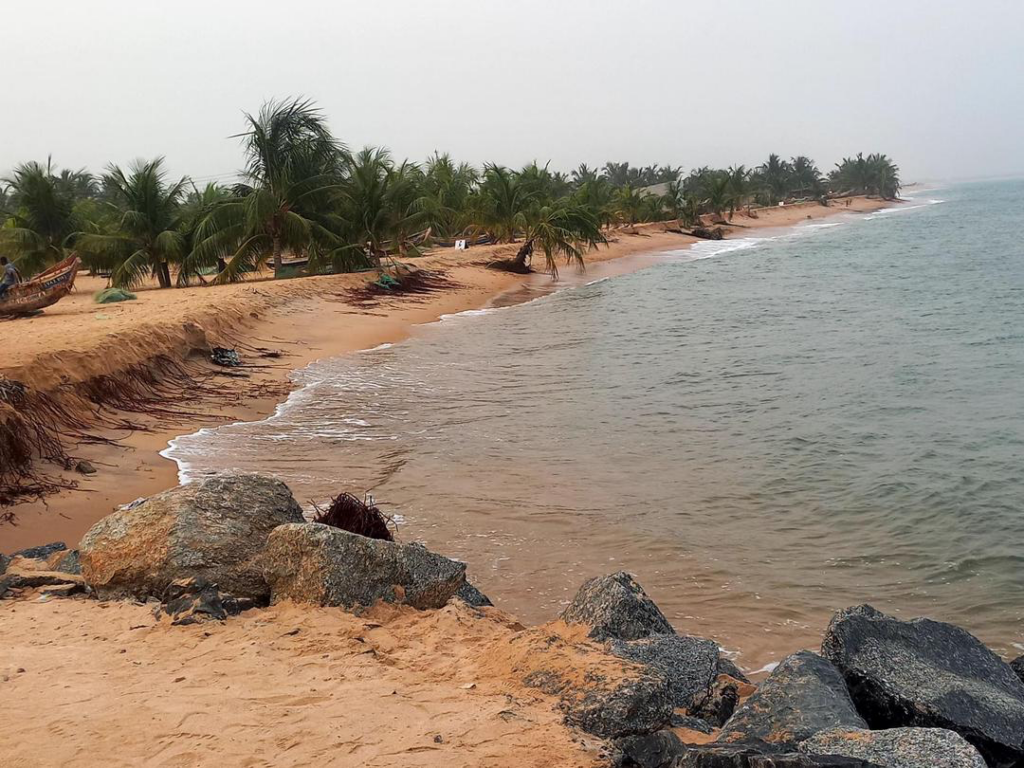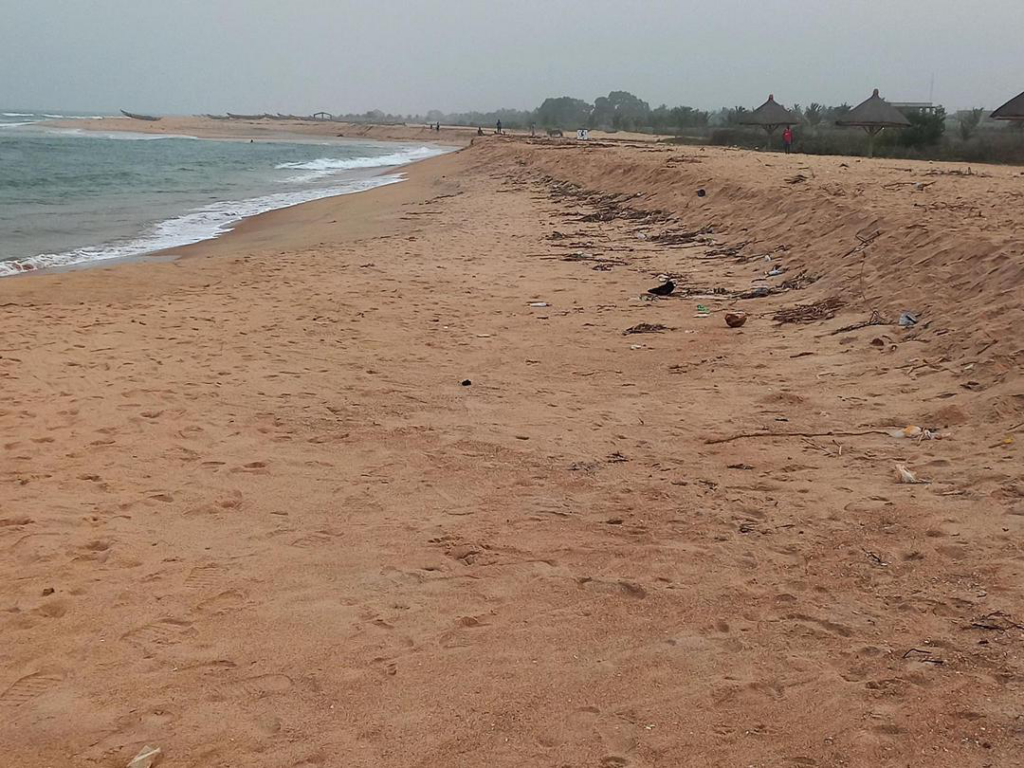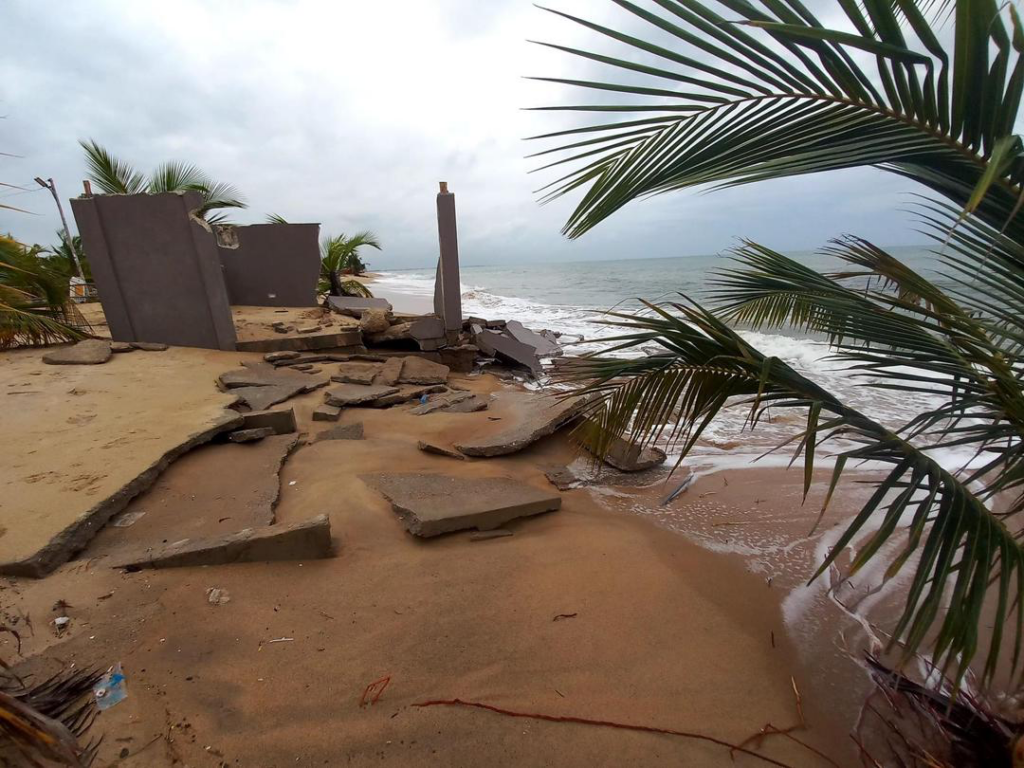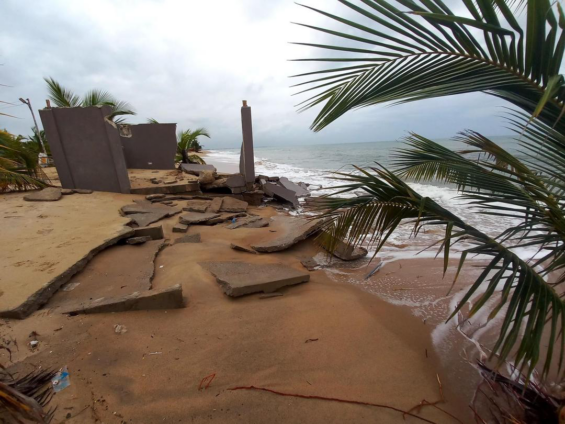Climate Change is often discussed in the news these days. It may sound like a topic fit for classrooms and a gathering of cabinet ministers. In Ghana, it has been cited for the new emission taxes. Government officials have been traveling for COP conferences and the news related to that appears in the media. This may make us feel climate change is an abstract topic. In this opinion article, we explain that climate change concerns all of us. We limit our discussion to three roles, these are farmers, coastal residents and everyone who buys foodstuffs.
Farms, crops et al.
Let’s first deal with the farmer. Some young working people in Accra and beyond have farms somewhere in the rural areas. Others have relatives in the village who are farmers. This point is thus important to all.
On this point, we will discuss droughts, irregular rainfall patterns and floods. Weather shifts are normal, rain does not always start on an exact day of the year if one looks at data going back many decades. There are always shifts but why is the current trend a problem? Climate change is a problem here because the changes in weather patterns have become more irregular, unpredictable, and filled with extreme patterns. Rain can fall in the middle of Harmattan and delay the rainy season by several weeks. Sometimes the rainy season can be so short that it cannot support the regular cycles of ploughing land, sowing seeds, waiting for harvest and everything in between. Patterns that have shaped farming behaviour, harvest cycles and pricing trends.

For instance, the incidence of droughts used to occur only once every several decades and after the drought there is a stable recovery. However, with climate change, droughts have become more regular, and last longer. This makes it difficult for both the land and people to recover. It will take more time and during this period livelihoods will be lost; people will migrate to already burdened urban centers. These longer droughts can be extreme or subtle in the form of rare rainfall, low yield and scarce water. People who have lived on their ancestral lands for centuries now have to compete with others for water and in some cases, they cannot farm at all. Our grandparents have stories of droughts which they either witnessed or heard from their parents but in our lives, we (even if not in your village, somewhere on the planet) are experiencing more droughts than those of our grandparents and great-grandparents combined.
Let’s now move to irregular rainfall patterns. In Ghana, farmers rely on rainfall and plant their crops around the patterns. In recent years this pattern has been irregular with the expected rainy seasons coming either too early, too late, or sometimes too scattered. Take for instance in 2019 or 2020 when the first rains (major season) were heavy for 3 days in many regions and afterwards, there was no rain for many weeks in many parts of the country. Farmers planted their crops after the first few falls and anticipated a regular rainfall pattern such as good rain every day for a week or two. This was however not the case, and many farmers lost their seeds because they failed to germinate. This meant a low harvest later and high prices of maize the next year. That is where everyone gets affected but let’s leave that discussion for another paragraph.
Thirdly, let’s talk about the issue of floods. We are not geography experts but what we understand is that one of the reasons for floods in farmlands is too much rainfall than the soil and waterways can take at a time. The effect of this is lost seeds and crops. This means farmers lose money, are unable to sell and still have to pay back all the credit they took to buy seeds and other supplies. Heavy rains from time to time are normal but when there is heavy rain for three days continuously and farmlands flood for several days, farmers lose their seeds and that can affect harvest and prices later. These days most farmers buy their seeds, so losing them is also an economic loss.
We have dealt with how climate change is relevant to farmers in Ghana, let’s now explain it to those who live along the coast and everyone who consumes seafood.
Hello Beach people
Now let’s deal with the coast. We are familiar with the coasts of Keta, Anomabo and Elmina where sea defence projects have come to the rescue of the people. In some parts of Keta where there is no wall, people can wake up to flooded floors and half of their concrete building lost to the tidal waves. Let’s be clear here, coastal erosion has always existed, and it is a normal occurrence on the earth. Some lands will be lost to the ocean from time to time and some may get exposed. However, climate change is suspected to have hastened this process and made it too frequent because of many reasons including these two. Rising temperatures and rising sea levels.

Rising temperatures have caused iced glaciers to melt and made oceans warmer. This makes coastal communities more vulnerable to higher sea levels and more radical tides. The people of Keta for instance can recall how their grandparents told them about tidal waves and what happens when the water recedes and later comes back to ‘take people’s home’. Even the classic story of Bishop Herman praying with his ring to protect the church and school may be known to many older folks in Keta. The current frequency of the waves has led to shrinking space for living, forced migration and increased uncertainty about ‘the next wave’.
Now, how is that your business? It is your business because shrinking space means more migration to crowded urban areas and a higher risk of disease outbreaks in populated temporary shelters. So far, the effects of these erosions seem to have been contained in the coastal communities, but for how long? People have lost homes used by several generations of their families, fisher folks have lost their boats, and schools and hotels have woken up to flooded rooms. We used to think coastal erosion in Ghana was restricted to Keta, but today, visit Anomabo, Cape Coast and Elmina. You will notice the sea defence projects and the increasingly ‘rowdy’ waves. If you love fish, know that these events reduce the ability of fisherfolks to comfortably set sail.
Some even lose their boats and others have to spend time relocating their boats to the safest high ground. That reduces the time they have to find you fish; this leads to price increases (on top of fuel-linked price hikes). Climate Change has even been cited for fish scarcity at the coast because sometimes fish may migrate to deeper oceans after experiencing unusual waves. There is also evidence that warmer oceans hinder the ability of certain fish populations to reproduce efficiently. Some fish are accustomed to specific temperature ranges, if the ocean around us gets too warm, these fish will migrate to more temperate zones to survive. This is what some experts describe as shifting to poles because the fish migrate towards the north and south poles where temperatures are still relatively cold compared to our Gulf of Guinea.
Now let’s get to everyone else. That is, YOU! Anyone who eats or uses anything grown in Ghana, like maize for banku or kenkey, pepper, tomatoes (at least the local one) and shea butter.
Everyone!
Finally, let’s consider how these two instances above (climate change on farming and coasts) affect all those who buy foodstuffs whether in Accra or anywhere in Ghana. We will approach this in two ways, first a look at basic staples or grain we grow and use in Ghana and secondly things we use on our skin or export for some money.
Let’s deal with food first. We all buy maize; many people love fish from the sea and others can’t resist shea butter for their skin. Well, I have bad news for you. Climate change is making all these commodities expensive because of low yield which leads to less supply. Indeed, fuel prices and other factors contribute to higher prices, but scarcity is also a factor. It is more frequent these days because poor harvest is no longer a matter of once a decade or so but now it is a matter of several times in a decade. Incomes are not increasing but you must pay more for these foodstuffs.
Now, let’s talk about something you have noticed in recent months. The heat, some say Accra is in a frying pan. Well, high heat periods are normal but if they last too long and occur frequently there is poor yield and that can affect prices later. Hopefully, this current heat ends soon because the cost of food is already too much. Anyway, that was just by the way. Back to the climate change issue and your plate. If farms get flooded, or there is a drought, those at the market have to pay more for the limited supply and they will pass on this cost to you.
For the ladies, shea butter is heavily reliant on natural weather circumstances, because there are rarely any commercial shea farms or irrigated farmlands for shea. A longer drought or a flood means, people will pick fewer nuts and therefore produce less shea butter though the demand may have risen. This automatically leads to higher prices.
Have you noticed that? The cost of keeping your skin healthy rises and any other use you had for shea butter might be more or you have to forgo it entirely. In this case, you thought climate change was an alien topic but here it is in your wallet. How about cherished crops like Cocoa? As I write this piece, Cocoa prices are at record highs because international traders are scared about the gradually reducing yield and the current extreme weather patterns.

This combination of consistently reducing yield for years and extreme weather patterns only means higher cocoa prices on the international market and higher cost of cocoa products we use. All the way from cocoa butter to the cocoa beverages and everything in between. Now, you may think Ghana is safe because we export cocoa. Well, that is not entirely true. Low yield means less money for farmers, especially when they must use the money to fight pests which are spreading faster because of extreme heat by Ghanaian standards.
Additionally, those world market cocoa prices don’t directly impact farmers in Ghana as regulatory bodies like COCOBOD set prices sometimes per season. Meanwhile, those who buy the beans for their factories from bulk suppliers may have to pay high prices and thus increase the prices of all the chocolate and other products they make. We love Golden Tree Chocolate, but we also know Ghanaians love ‘foreign chocolate’, so we can’t run away from the higher prices.
Bringing it all together
Climate change is NOT a topic restricted to classrooms and cabinet gatherings. It concerns everyone who lives. Even the dead should be concerned if they could. Because in some parts of Ghana flooding, coastal erosion etc. is destroying cemeteries and shrinking the space available for decent burials.
Let’s get back to the living!
Ghana is not an industrialized country so we do not produce industrial pollutants like the volume of the G7 or India. But we are more vulnerable to climate change than any of the G7 countries. While we live our ‘modest’ lives here, mini droughts are reducing yield, floods are taking our livelihoods, and the ocean is roaring at us. Extreme temperatures have become regular making Air Conditioning and regular cold hydration necessities. That affects your pockets too. The same climate change has made farming and fishing more difficult, so the younger people from those communities end up in the already crowded urban centres. Now in these urban centres, flooding is more regular so renting a home is more difficult because you must watch out for flood-prone compounds. Basic staples like maize are not as common as they used to be, so the local ones are expensive, and we even have to import some. Double trouble!
Anyways, after all these then the question, what can I do?
Well, climate change is already in motion (nowhere near full speed yet) and the only way out for you is to cope with it. But for governments and everyone (including you) reducing emissions can prevent things from getting worse than it is now or will be in a decade from now. You can help yourself by choosing to live in more green environments, making ventilation in your house a top priority and adopting a more pro-environmental mindset. This means conserving energy when you can, recycling when you can, eating healthy and exercising to reduce risk of getting diseases which are getting worse or more frequent because of extreme temperatures.
The link between climate-change and health is well established but that will be for another column.
In Ghana, back in basic school students were taught some pro-environmental behaviours such as tree planting, proper disposal of refuse and energy conservation. Let’s get back to these and make sure we can cope well with the rising temperatures and extreme weather. Keep your gutters clean, have some soil at home to sink down rainwater and reduce pressure on the drains, get good ventilation and don’t burn refuse, rather sign up to waste disposal firms who can collect everything. Do you know you can dump biodegradable waste such as banana skins, etc. in your garden? It’s good for the soil and get some trees in your house too. It can help with the heat. To the farmers, better practices such as low-cost irrigation sponsored by government of farmers unions can help. Those in coastal erosion-prone areas can unite and get boulders (like sea defence) to slow down the speed of the high tide and minimize the damage. In summary, we can do something to cope with the extreme weather while we hope that the whole world acts to reduce the pollution to help the earth restore itself sooner, rather than later.
About the Authors
We are Fellows of the Center for Climate, Health, Mobility and Behavior Advocacy. Our names are Martin Gameli Akakpo (PhD), Psychologist and researcher and Hayford Alufar Bokpin (PhD); Social Economist and researcher. Contact: cmhbghana.com
Latest Stories
-
Trade Ministry pledges commitment to agricultural transformation at UKGCC Grand Challenge Programme
45 minutes -
NLA’s Chief Internal Auditor honoured at the Ghana Executive Management Awards
1 hour -
African Forest Forum launches AY4F platform to empower young forestry professionals
1 hour -
A Rocha Ghana warns of devastating impact of L.I. 2462 amendment
2 hours -
Experts call for stricter enforcement of Land Act amid rising land disputes
2 hours -
Ghana is a nation blessed with religious harmony – President Mahama
2 hours -
Stop building on waterways to avoid havoc – President Mahama
2 hours -
Korean star Kim Soo-Hyun denies accusations by late actress’ family
2 hours -
Betis should crowdfund to extend Antony loan – Isco
2 hours -
Depending on aid will not take Ghana out of poverty – Ayorkor Botchwey
2 hours -
Africa Education Watch condemns GETFund allocation to MPs for education projects
2 hours -
Joy FM wraps up 2025 Ghana Month celebration with Accra High Street Walking Tour
3 hours -
My promises aren’t mere words, but a commitment to enhancing lives – Mahama
3 hours -
Embrace education – John Mahama tells Muslim youth
3 hours -
Our development rests on our unity, not division – Mahama Ghanaians at Eid-ul-Fitr event
3 hours

